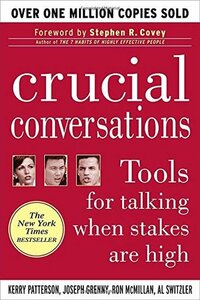Take a photo of a barcode or cover
717 reviews for:
Crucial Conversations: Tools for Talking When Stakes Are High
Ron McMillan, Kerry Patterson, Al Switzler, Joseph Grenny
717 reviews for:
Crucial Conversations: Tools for Talking When Stakes Are High
Ron McMillan, Kerry Patterson, Al Switzler, Joseph Grenny
informative
reflective
slow-paced
I started reading this book for work and eventually grabbed my own personal copy because it is very dense in information and I know I will need to read it again, if not more, to absorb all of it. Even in the end, the authors talk about how dense this little book is and how it can be a struggle to take it all in. Highly recommended for the world to read.
A weight was lifted off my shoulders when I decided to just skip the second half of the book.
Whilst the advice is good, the writing is a jumbled mess that you don’t pick up any of the actual points. They complete half of an example before going onto another one. They also appear to add in code words for random things, seems like they are almost wanting to trade mark common conversational strategies to me but idk.
I feel like a lot of this advice could be found online in a more succinct format. The chapters were way too long, they could’ve gotten to the point much quicker and with less examples thrown around haphazardly.
Whilst the advice is good, the writing is a jumbled mess that you don’t pick up any of the actual points. They complete half of an example before going onto another one. They also appear to add in code words for random things, seems like they are almost wanting to trade mark common conversational strategies to me but idk.
I feel like a lot of this advice could be found online in a more succinct format. The chapters were way too long, they could’ve gotten to the point much quicker and with less examples thrown around haphazardly.
informative
medium-paced
Had some good points but was so beyond boring, had to read for a job
Didn’t feel like rocket science to me, but I’m always down to be a better communicator.
This is not my usual sort of book, for two reasons: I don't often read nonfiction and when I do, it's not anything that could be classified even loosely as self-help.
The first note I made in this book was bout its self-congratulatory tone, and the authors do throughout seem smug and confident. I can imagine them on a stage with fancy headpiece microphones throwing out air quotes around the various buzz words/phrases they introduce in the book and all but inviting people to do trust falls. In spite of all that, I did get a few useful things from this book, notably that it's good to find a common purpose when having a tough conversation rather than landing yourself in essentially an argument about who's right and that you have to be careful about inventing stories/motivations for how others address you. I'm bad about both of these things in my personal communication, and already I've found myself in conversations thinking about the actual information being given to me vs. the narrative I want to hear and be offended by. These are pretty obvious things now that I've read them, but I had never really thought of them in such plain terms, and I think I'll find them useful.
I think I could have gotten most of the useful info from the book in a 5-page paper, though. Often enough, the book felt like basically a sales pitch for the consulting services I imagine the authors provide. So my rating for the book itself is pretty low, though a couple of the ideas I think will be pretty useful for me to keep in mind as I have even not-very-tough conversations.
The first note I made in this book was bout its self-congratulatory tone, and the authors do throughout seem smug and confident. I can imagine them on a stage with fancy headpiece microphones throwing out air quotes around the various buzz words/phrases they introduce in the book and all but inviting people to do trust falls. In spite of all that, I did get a few useful things from this book, notably that it's good to find a common purpose when having a tough conversation rather than landing yourself in essentially an argument about who's right and that you have to be careful about inventing stories/motivations for how others address you. I'm bad about both of these things in my personal communication, and already I've found myself in conversations thinking about the actual information being given to me vs. the narrative I want to hear and be offended by. These are pretty obvious things now that I've read them, but I had never really thought of them in such plain terms, and I think I'll find them useful.
I think I could have gotten most of the useful info from the book in a 5-page paper, though. Often enough, the book felt like basically a sales pitch for the consulting services I imagine the authors provide. So my rating for the book itself is pretty low, though a couple of the ideas I think will be pretty useful for me to keep in mind as I have even not-very-tough conversations.
informative
reflective
informative
medium-paced
Scenarios were all over the place. Book suggested to deal with sexual harassment yourself…
informative
inspiring
fast-paced



